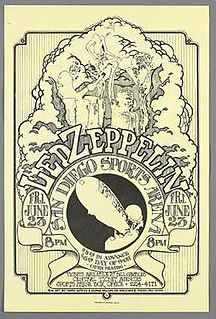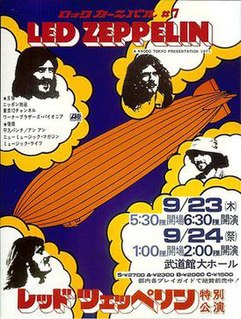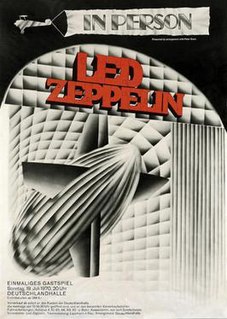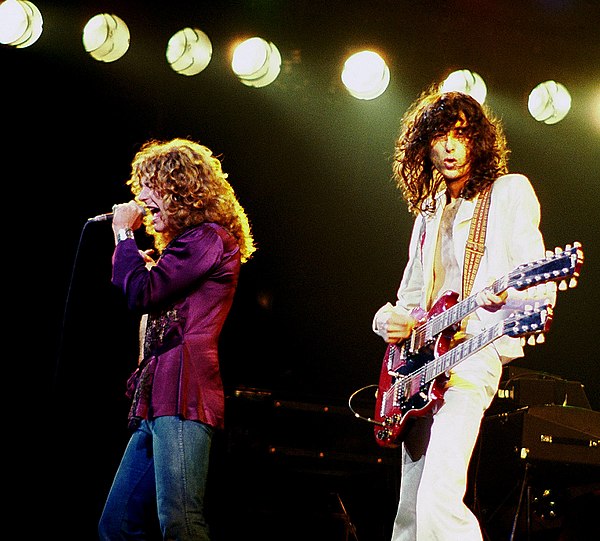
"Black Dog" is a song by English rock band Led Zeppelin, the opening track on their fourth album (1971). The song was released as a single and reached the charts in several countries; however, as was their practice, it was not issued in the United Kingdom. The song was included in Rolling Stone's (US) "the 500 Greatest Songs of All Time" and ranked No. 1 in Q magazine's (UK) "20 Greatest Guitar Tracks".

Tour Over Europe 1980 was the last concert tour by the English rock band Led Zeppelin. The tour ran from 17 June to 7 July 1980. Ten of the tour's shows were performed in cities throughout West Germany, as well as one show each in Brussels, Rotterdam, Vienna, Zürich, and West Berlin.

Led Zeppelin's 1977 North American Tour was the eleventh and final concert tour of North America by the English rock band. The tour was divided into three legs, with performances commencing on 1 April and concluding on 24 July 1977. The tour was originally intended to finish on 13 August, but was cut short following the death of Robert Plant's son.

Earls Court 1975 were five concerts performed by the English rock band Led Zeppelin at Earls Court Arena in London in May 1975.

Led Zeppelin's 1975 North American Tour was the tenth concert tour of North America by the English rock band. The tour was divided into two legs, with performances commencing on 18 January and concluding on 27 March 1975. It was preceded with two European warm-up shows, performed at Rotterdam and Brussels respectively.

Led Zeppelin's 1972–1973 United Kingdom Tour was a concert tour of the United Kingdom by the English rock band. The tour commenced on 28 October 1972 and concluded on 30 January 1973.

Led Zeppelin's 1972 North American Tour was the eighth concert tour of North America by the English rock band. The tour was divided into two legs, with performances commencing on 27 May and concluding on 28 June 1972. It included two warm-up shows in Europe.

Led Zeppelin's 1971 Japanese Tour was the first in Japan by the English rock band. Commenced on 23 September and concluding on 29 September 1971, it was one of the first tours of Japan by a western rock band.

Led Zeppelin's 1971 North American Tour was the seventh concert tour of North America by the English rock band. The tour commenced on August 7 and concluded on 17 September 1971. It included two warm-up shows in Montreux, Switzerland.

Led Zeppelin's 1971 European Tour was a concert tour of Europe by the English rock band. The tour commenced on 3 May and concluded on 5 July 1971. It included one concert at Liverpool, England, which was a rescheduled date from their preceding tour of the United Kingdom. It is possible that other unverified dates in Europe were also performed during this period.

Led Zeppelin's Spring 1971 United Kingdom & Ireland Tour was a concert tour of the United Kingdom & Ireland by the English rock band. The tour commenced on 5 March and concluded on 1 April 1971.

Led Zeppelin's Summer 1970 North American Tour was the sixth concert tour of North America by the English rock band. The tour commenced on 10 August and concluded on 19 September 1970.

Led Zeppelin's Summer 1970 tour of Iceland, Bath and Germany was a concert tour by the English rock band. The tour commenced on 22 June and concluded on 19 July 1970.

Led Zeppelin's 1970 United Kingdom Tour was a concert tour of the United Kingdom by the English rock band. The tour commenced on 7 January and concluded on 17 February 1970.

Led Zeppelin's Autumn 1969 North American Tour was the fourth concert tour of North America by the English rock band. The tour commenced on 17 October and concluded on 8 November 1969.

Led Zeppelin's Summer 1969 United Kingdom Tour was a concert tour of the United Kingdom by the English rock band. The tour commenced on 8 June and concluded on 29 June 1969. It included a single show in Paris, France, performed for French television. This was the band's final ever television appearance, portions of which were later released on the Led Zeppelin DVD.

Led Zeppelin's 1968/1969 tour of North America was the first concert tour of North America by the English rock band. The tour commenced on 26 December 1968 and concluded on 16 February 1969. It was important for the band, as their popularity grew substantially because of the concerts and helped them reach significant commercial success in the US, which translated to sales elsewhere.

Led Zeppelin's 1968 tour of the United Kingdom was the first concert tour of the United Kingdom by the English rock band. It commenced on 4 October and concluded on 20 December 1968.

The Knebworth Festival 1979 consisted of two concerts performed by the English rock band Led Zeppelin and other artists at Knebworth House, Hertfordshire, England, in August 1979.




























